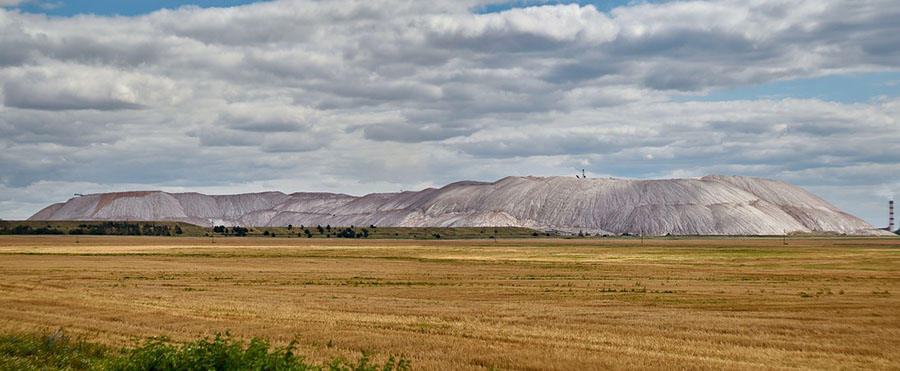The Mining Report: Focus Ventures Ltd. (FCV:TSX.V) has been described as a "pure phosphate play." Is this a story that sells?
Ralph Rushton: David and I have been on the road a lot over the last year, marketing the project and the company. We've been to conferences with fertilizer manufacturers and the usual investment conferences, such as those run by Cambridge House and the Prospectors and Developers Association of Canada. The key is getting through this part of the downturn. We're not dealing with a grassroots project looking at copper or gold anomalies somewhere in the mountains—and that goes down well with potential institutional investors. Bayovar 12 is a more advanced development-stage project where you can clearly see the simplicity of the geology and the logistics.
David Cass: Also sharing similar geology to the world-class Bayovar phosphate mine located next door definitely turns a few heads, as does the fact that we have a marine port facility available, owned by our partners JPQ, located 40 kilometers (40km) from the concession; this is a huge benefit to our project.
RR: A lot of private equity groups and institutions understand that food production is becoming increasingly important, and anything that feeds into the expansion of food production will have a market down the road.
TMR: Why should investors get excited about phosphates?
RR: Phosphorus is a commodity that has no substitute in the global economy. Without phosphate fertilizers, large parts of the world would see decreased food production and, potentially, starvation. Global phosphate rock consumption is increasing by about 1.5–2% per year. Phosphate demand forecasts suggest all credible new production capacity—projects with existing infrastructure or accessible local markets—will be absorbed by demand growth.
Organic food is another growing trend to watch. That was a $64 billion ($64B) global industry in 2014. The U.S. organic market alone is a $25–30B industry that is growing at 9% a year. Organic farmers must use natural fertilizer, and the rock from our Bayovar 12 phosphate project in Peru is one of the best natural rocks in the world. That's a snapshot of why we're excited about phosphates.
TMR: Who among your management team has experience developing phosphate assets?
DC: We've all worked in very diverse cultures. Most people in the company have worked exclusively on metals projects and are fairly new to the phosphate business. But certain aspects of Bayovar, namely drilling, resource estimation and geology, overlap with many of the projects we've worked on previously. Ralph and I come from Anglo American Plc (AAUK:NASDAQ) and Focus Ventures Chairman and CEO Simon Ridgway has deep contacts in the capital markets both here in Canada and in Europe. I've been working with Simon's group since 2007 and over that period companies under his management have raised close to $0.5B, enabling a couple of mines to be put into production by Fortuna Silver Mines Inc. (FSM:NYSE; FVI:TSX; FVI:BVL; F4S:FSE). We also sold other projects that subsequently became mines.
Early on, we recognized that we needed to add engineering and phosphate beneficiation experience, and so we hired Tim Oliver as the director of projects. Oliver is an environmental engineer who has worked on many engineering projects in the Americas, including phosphate projects in the United States. He manages our team of engineering consultants who are carrying out our preliminary economic assessment (PEA). On the phosphate beneficiation side, we added Glenn Gruber as an adviser. Gruber has spent his entire 50-year career working in phosphates. He started in the Bayovar region in 1982 and was later involved in the Vale S.A. (VALE:NYSE) test work. Vale's mine is now in production. On the local side, we have Absalon Aguilar, a geologist who lives in Piura, Peru. He's worked in the Bayovar district since 1962 and he's an expert in phosphate processing and metallurgy. Aguilar also represented the government during the privatization of the Bayovar district in the late 1990s.
This depth of experience is going to allow us to access the resources that we need to continue developing the Bayovar 12 project.
TMR: Tell us why you believe Bayovar could be a company-making asset.
DC: There are two key points: geology and logistics. We have simple geology. Essentially, it's 13 phosphate beds, consistent in width and grade, that continue for miles. The phosphate occurs as pellets that are amenable to simple two-stage processing using seawater and flotation, which results in a marketable concentrate.
In terms of logistics, we're situated about 40km from the coast and an ocean port, with easy access to Brazil, Mexico and the U.S., three of the world's largest phosphate consumers. Many phosphate projects are located far from tidewater in the middle of big continents, like Africa or Australia, with massive infrastructure requirements.
TMR: In September, Focus Ventures published a maiden resource estimate for Bayovar of 150 million tons (115 Mt) Indicated grading 12.37% phosphorus pentoxide and another 73 Mt Inferred grading 12.44% phosphorus pentoxide. How does that compare with other companies' early stage phosphate projects?
RR: In terms of tonnage, it's one of the largest projects out there that is held by a junior company, and it's one of the very few with such good logistics and easy access to the coast. But it's important to understand that a phosphate resource is not simply about tons and grade. It's a multi-element chemistry issue; how well the rock upgrades and reacts is vitally important.
To make modern fertilizers, phosphate rock is mixed with sulfuric acid to produce phosphoric acid. That phosphoric acid is then reacted with ammonia, and has potassium added, to produce the nitrogen-phosphorus-potassium (NPK) fertilizers that you can buy at your local garden center.
The high levels of carbonate, which is present in the main phosphate mineral at Bayovar, makes it excellent for acid production. So although the Bayovar phosphate grades can be lower than at some other projects, it more than makes up for that in the amount of total phosphate that's liberated during the reaction to make acid or in soils to be absorbed by plants. Some of the African projects are higher grade, but they're less reactive. If we consider its effectiveness in the manufacture of phosphoric acid, which is the precursor for modern NPK fertilizers, that reactivity is key.
TMR: Is there room for further resource growth?
DC: Absolutely. Our maiden resource was based on only 20 drill holes, spaced about 800 meters (800m) apart. We drilled 20 holes because that was what the initial drill permit allowed. But we believe, based on what we see in those drill holes, that we can perhaps double the existing resource with another 30–40 holes. Drilling is pretty cheap because of the softness of the sandy host rock and excellent logistics.
TMR: Do you have the necessary permits for the next round of drilling?
DC: Our drill permit application has been submitted and we should have it soon.
TMR: Do you need to find an offtake partner for phosphate or can you just sell it directly to end-users?
RR: There are three avenues to market the product. One is an offtake agreement, where the buyer is locked in for a period of time for a certain amount of material every year. Sometimes these agreements include provisions for project development capital. Then there's the merchant market, where you produce a shipload of rock and try to sell it. That's about 10% of the market. A third avenue is targeted production, where you produce direct-application phosphate rock. This involves mining the phosphate ore, crushing it and essentially selling it as is. There's a market in Latin America for direct application rock and Bayovar has some of the best in the world.
TMR: Does that mean there's going to be a premium for your phosphate?
DC: Yes. Sechura phosphate rock is highly regarded in the fertilizer market because of its extreme reactivity and solubility, and is known as "SPR." The direct-application rock reacts quickly with slightly acidic soils and the phosphate releases almost immediately.
RR: At the mine-production end, prices range from $100/ton up to maybe $200/ton for direct application material, but the further downstream you go and the closer you get to retail distribution, the higher the price gets. Because it's certified as organic, we've seen prices of up to $10,000/ton for what is packaged into the small two-kilogram plastic tubs that get sold to people growing tomatoes in their backyard. If you can get into branding, there's good money to be made.
TMR: Let's talk about the jurisdiction. Peru is a well-established mining jurisdiction, but some mining companies have run into opposition in rural Peru. How is your company working on building relationships with local stakeholders?
DC: These days, poor community relations can halt the biggest mining projects. The permitting process in Peru requires us to conduct community consultation and get a mandate from the community at every point of our project's evolution. To date, we've had no issues. The Bayovar 12 project is close to the Pacific coast, and there are no communities living on the property. The nearest community is a small fishing village near the Vale operations. It's also easier for communities to visualize the benefits from mining projects when they see long-term employment and royalty streams coming from an existing mine like the one operated by Vale.
TMR: When will investors see the Bayovar 12 PEA?
RR: Probably sometime during Q3/15.
TMR: What is your current cash position and when do you expect to return to the market?
DC: We have about $600K. We have an option payment of $3M to make at the end of February 2015, so we're going to be raising cash within Q1/15.
TMR: Focus Ventures is part of the GoldGroup. How does that aid Focus investors?
RR: Our investors can be confident that the team has access to a lot of experience and practical hands-on exploration know-how. We keep it practical, and we try to make go/no-go project decisions as fast as we can.
TMR: Is the ultimate goal to develop Bayovar 12 to sell it, or to go into the phosphate mining business?
RR: We recognize that a project of this scale is not something we can take on alone so we're going to advance the engineering studies for a major open-pit operation and hope to attract an offtake partner as key milestones are reached. There are two other major projects in the region: Vale's Bayovar mine and the Fospac project, which is next door. Both are three-way joint ventures with substantial industry partners involved. We know that we have to complete the engineering and metallurgical work before we can attract a major investor.
We're also going to look long and hard at developing this as a small-scale, direct-application phosphate rock operation, similar to DuSolo Fertilizers Inc.'s (DSF:TSX.V), which is selling to a concentrated local market in Brazil. We hope that this will get us into production and cash flow in a shorter time frame.
TMR: Clearly, the focus is on phosphate, but Focus Ventures recently signed a joint-venture agreement with Daewoo International Corp. (047050:KRX) on the Aurora porphyry copper-molybdenum project in Peru. Does that detract from the phosphorus story or enhance it?
DC: Aurora is really a legacy project. We acquired Aurora a couple of years before we acquired the Bayovar 12 project. We were negotiating an agreement with Daewoo, one of the world's biggest trading companies, for quite some time. The agreement calls for Daewoo to fund the project, which will have a dedicated project team working on it so there won't be any financial or personnel impact on Bolivar 12. Having a major partner like Daewoo involved can only serve to enhance the visibility of Focus Ventures and all of our projects.
TMR: Thank you for talking with us today, gentlemen.
David Cass is the president and director of Focus Ventures. He is a geologist with over 25 years of international experience in mineral exploration and mining for precious and base metals. Fifteen years of his career were spent with major mining company Anglo American Plc, where he held positions of increasing responsibility in jurisdictions such as Turkey, Iran, Eastern Europe and the Americas. Since 2006, Cass has worked for junior exploration companies exploring in Canada, Mexico, Central America and Peru. He holds a Master of Science degree in mineral exploration and mining geology from the University of Leicester and a Bachelor of Science degree in geology from London Metropolitan University. He is a practicing member (P.Geo) of the Association of Professional Engineers and Geoscientists of British Columbia.
Ralph Rushton is vice president of corporate development and director of Focus Ventures. He has over 25 years of experience in mining and exploration, much of which was gained working as a geologist in Southern Africa, the Middle East and Eastern Europe. For the last 11 years he has worked in business development and investor relations for a number of junior companies and currently serves as a director on the boards of Radius Gold, Rackla Metals and MedGold Resources, as well as Focus Ventures. Rushton holds a Bachelor of Science in geology from Portsmouth University in the U.K., a master's degree in economic geology from the University of Alberta, and a Certificate in Business Communications from Simon Fraser University.
Want to read more Mining Report articles like this? Sign up for our free e-newsletter, and you'll learn when new articles have been published. To see recent interviews with industry analysts and commentators, visit our Mining Report home page.
DISCLOSURE:
1) Brian Sylvester conducted this interview for Streetwise Reports LLC, publisher of The Gold Report, The Energy Report, The Life Sciences Report and The Mining Report, and provides services to Streetwise Reports as an independent contractor. He owns, or his family owns, shares of the following companies mentioned in this interview: None.
2) Focus Ventures Ltd. paid Streetwise Reports to conduct, produce and distribute the interview.
3) David Cass and Ralph Rushton had final approval of the content and are wholly responsible for the validity of the statements. Opinions expressed are the opinions of David Cass and Ralph Rushton and not of Streetwise Reports or its officers.
4) Interviews are edited for clarity. Streetwise Reports does not make editorial comments or change experts' statements without their consent.
5) The interview does not constitute investment advice. Each reader is encouraged to consult with his or her individual financial professional and any action a reader takes as a result of information presented here is his or her own responsibility. By opening this page, each reader accepts and agrees to Streetwise Reports' terms of use and full legal disclaimer.
6) From time to time, Streetwise Reports LLC and its directors, officers, employees or members of their families, as well as persons interviewed for articles and interviews on the site, may have a long or short position in securities mentioned. Directors, officers, employees or members of their families are prohibited from making purchases and/or sales of those securities in the open market or otherwise during the up-to-four-week interval from the time of the interview until after it publishes.




























































